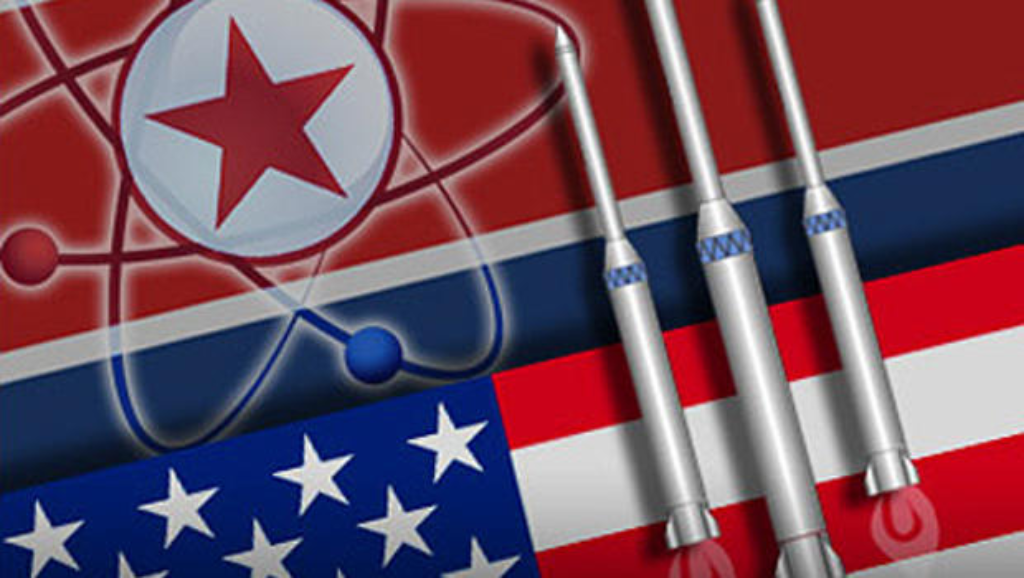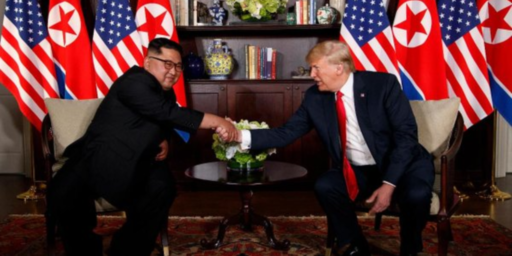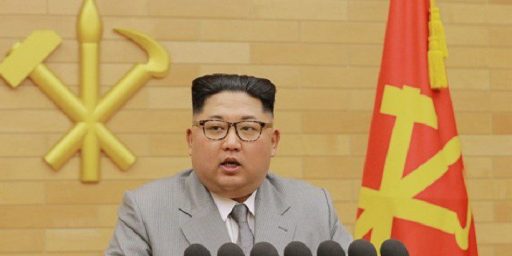North Korea Throws Cold Water On Future Negotiations
North Korea appears to be pulling back from any future negotiations over its nuclear weapons and ballistic missile programs, leaving the Trump Administration's Korea policy in shambles.

North Korea is pouring a big bucket of cold water on the idea of resuming negotiations of any kind with the United States, thus throwing the Trump Administration’s entire strategy in relation to the Korean Peninsula in doubt:
SEOUL, South Korea — North Korea said on Sunday that it had no desire to engage in “sickening negotiations” with the United States anymore, rejecting Washington’s suggestion that negotiators from both countries meet again in Stockholm in two weeks.
In a statement issued a day after bilateral talks broke down in Stockholm on Saturday, the North Korean Foreign Ministry said it would not meet with American negotiators again until after Washington took “a substantial step” to “complete and irreversible withdrawal of hostile policy.”
The ministry suggested that the Trump administration, faced with a slew of domestic political scandals, was more interested in forcing a deal on North Korea and claiming a major diplomatic achievement to help the president’s re-election bid than in satisfying the North’s demands.
“The U.S. has actually not made any preparations for the negotiations but sought to meet its political goal of abusing the D.P.R.K.-U.S. dialogue for its domestic political” interests, said the ministry’s statement, which was carried by the North’s official Korean Central News Agency. D.P.R.K. is the abbreviation of the North’s official name, Democratic People’s Republic of Korea.
Shortly after the talks broke down, Morgan Ortagus, a State Department spokeswoman, said the United States had accepted the invitation of the Swedish government for American and North Korean negotiators to return to Stockholm to meet again in two weeks. On Sunday, North Korea called that idea “ungrounded.”
Negotiators from the United States and North Korea had met to resume denuclearization talks that had stalled since the collapse of the second summit meeting between Mr. Trump and North Korea’s leader, Kim Jong-un, in Hanoi, Vietnam, in February. That meeting foundered on disagreements about how fast and how thoroughly the North should dismantle its nuclear program and how soon the United States would ease its sanctions.
Kim Myong-gil, the North’s chief negotiator, told reporters after meeting with his United States counterpart, Stephen E. Biegun, that the talks in Stockholm had collapsed because the American side came “empty-handed,” with no new proposals.
Mr. Trump has claimed that he can achieve what his predecessors, including former Presidents Barack Obama and George W. Bush, had tried but failed to achieve: the dismantling of North Korea’s nuclear weapons and their production facilities.
More from The Washington Post, which goes on to report that the DPRK is giving the Trump Administration until the end of the year to change its policies and its approach to negotiations:
North Korea on Sunday gave the Trump administration until the end of the year to change its approach to nuclear negotiations if it wants the talks to continue.
“As we have clearly identified the way for solving [the] problem, the fate of the future DPRK-U.S. dialogue depends on the U.S. attitude, and the end of this year is its deadline,” the North Korean Foreign Ministry said in a statement.
The statement came a day after the sides met in Stockholm to restart the talks after an eight-month stalemate — and then disagreed publicly over how they went. The Trump administration described the working-level talks as “good discussions.” The Foreign Ministry called them “sickening.”
The top North Korean nuclear envoy, Kim Myong Gil, said Saturday night that the working-level talks had broken off “entirely due to the United States’ failure to abandon its outdated viewpoint and attitude.”
On Sunday, the Foreign Ministry accused the administration of “misleading the public opinion” by touting “good discussions.”
(…)
President Trump said last month that he was open to exploring a “new method” in the negotiations. Kim Myong Gil quickly responded with a statement welcoming the”new method” in place of the “Libyan model” of shipping out North Korea’s nuclear weapons before granting sanctions relief.
The Libyan model had been promoted by John Bolton, who was ousted last month as Trump’s national security adviser.
Chad O’Carroll, chief executive of the Korea Risk Group, said the North Korean negotiators might have gone to Stockholm with a “radical expectation” after Trump fired Bolton and floated a possibility of a “new method” in talks.
“Ahead of what is likely to be a bumpy election campaign for Trump in 2020, it appears that the North may be hoping that the combined effect of the ticking clock and American fears of long-range missile and nuclear tests in the year ahead will stimulate a significant shift in U.S. strategy at the eleventh hour,” O’Carroll said in an analysis posted on the NK Pro website.
All of this comes after what has been a relatively quiet summer on the North Korean front. While there hasn’t been any news that can be considered progress in any talks between the United States and the DPRK, there are also hasn’t been a significant breakdown. This is the case notwithstanding the fact that the season started out with warnings from Pyongyang that there would not be progress in talks between the two countries if the United States continued to insist on unrealistic goals for the talks. As the summer wore down, though, North Korea began warning the United States that made specific reference to those goals and stated that time was running out for the resumption of negotiations, now we have what appears to be a final deadline of the end of the year.
All of this appears to be a specific reference to American insistence that the ultimate goal of negotiations is the elimination of the DPRK’s existing nuclear arsenal, something that Pyongyang clearly isn’t going to do. In the meantime, North Korea has seemingly become more belligerent, launching a series of short-range missile tests that President Trump has largely dismissed despite the obvious threat they pose to South Korea and Japan.
Specifically, it is clear that the Trump Administration continues to base negotiations on a faulty understanding of what North Korea agreed to in previous meetings and what it is likely to agree to in the future.
Immediately after his first meeting with Kim Jong Un in Singapore, for example, President Trump claimed that there was no longer a nuclear threat from the DPRK because of what happened at the meeting. The evidence since that time, though, it has been clear both that Kim Jong Un did not agree to what Trump claimed and that the summit itself, as well as the two subsequent meetings between the men in Hanoi and at the Demilitarized Zone, were little more than photo opportunities.
The extent to which this statement from Trump was erroneous became apparent only months after that first summit. At that point, it was reported that North Korea was increasing production of the fuel needed to make additional nuclear weapons and that it was concealing the existence of ongoing nuclear weapons research at secret facilities well hidden from both surveillance and, most likely, the ability of the United States to take the sites out in a military strike. Additionally, it became apparent in the days after the summit that the much-publicized destruction of the DPRK’s primary nuclear weapons test site, a much-hyped pre-summit event that was witnessed by American and other international journalists, was much less than met the eye and that the site could easily be rebuilt if needed in the future. Weeks later, we learned that the DPRK had also begun work on the construction of new ballistic missiles at yet another secret site.. Additionally, analysts who have seen satellite images say that the DPRK has made a second large nuclear reactor operational. This type of reactor is capable of making plutonium which is, of course, one of the main fuels used in the production of nuclear weapons. This new reactor can reportedly make four times as much plutonium as North Korea’s current reactor, which has been the source for the plutonium needed for its nuclear arsenal to date. Finally, in the wake of the summit in Hanoi that again appears to have been more hype than hope, Pyongyang appears to be making major repairs to a previously abandoned ballistic missile test facility that could be signs that they are planning either a new round of tests or a satellite launch.
More fundamentally, though, the American position in talks with North Korea ignores the fact that the United States and North Korea have fundamentally different ideas of what “denuclearization” means. For the United States, it essentially means that the North Koreans would give up their nuclear weapons, their ballistic missile technology, and their research programs in both areas. In exchange, it appears that the United States has made what seem to be vague at best promises about sanctions relief and the grandiose promises that President Trump has made about the benefits that would result from to the North Korean economy if it opened itself to the world even though there’s no indication that Kim Jong Un or the leadership in Pyongyang want that kind of future for their country.
It’s still possible, of course, for the United States to end up with an agreement with North Korea that would go a long way toward reducing tensions on the Korean Peninsula. For example, we could finally negotiate an end to the Korean War via a peace treaty that includes not just the DPRK and the United States but also China and South Korea. This treaty could conceivably include agreements that would reduce tensions along the Demilitarized Zone that would include the removal of troops on both sides that have spent the last 60 years and more on a hair-trigger for war. Among other things, this would significantly reduce the risk to some of the most heavily populated areas of South Korea, which at the moment remain vulnerable to a North Korean military strike that could come with virtually no warning. Perhaps, this would make it possible for the United States to remove some of its forces in the future.
Developments over the past year also offer a guide to what talks with the North Koreans could realistically achieve. For example, tensions on the Korean peninsula, which have been on a razor’s edge since the end of the Korean War and ramped up significantly during the tit-for-tat exchanges that took place between President Trump and the North Korean leader throughout 2017, have calmed down significantly over the past year. Additionally, the relationship between North and South Korea appears to be better than it has been in several years during which the DPRK was engaged in provocative action such as firing missiles at a South Korean naval base and attacking a South Korean naval vessel. Making those changes permanent would be a good thing. However, as I have noted before (see here, here and here), if the United States continues to insist that the ultimate goal of these talks is the idea that North Korea will give up its existing nuclear arsenal then it is guaranteeing that the negotiations will fail.





Lovers quarrel?
This comes as no surprise to anyone who paid the slightest attention to North Korea’s behavior since the meeting between Trump and Kim. Kim got the one on one meeting with the US president that he wanted and had no interest in further talks. NK has alternated between failing to show up for negotiations and refusing any concessions when they did meet.
Kim is like a woman who met a guy once, didn’t like him, and can’t get him to go away and leave her alone. The signals are clear: Kim’s just not interested in anything Trump (or any other US president) has to offer.
@Kari Q: Trump gave Kim recognition on the world stage, which no previous president did. Kim got what he wanted, and kicked Trump to the curb. Humped and dumped, so to speak.
@CSK:
“Trump gave Kim recognition on the world stage, which no previous president did.”
And Kim also got US joint exercises with South Korea stopped. All for nothing in return.
Clearly Trump understands the Art of the Deal better than anyone.
While I am sure that all administrations take action based on their political goals (and should to the extent their political goals are intended to coincide with the country’s), I wonder when I see statements like this one whether more and more governments view the Trump administration has having no goal other than its own reelection.
It’s not that I have great trust for the DPRK messaging department, but this rings very true.
@Moosebreath: Totally. Great negotiating. Absolutely top drawer. Cult45 tells us we should watch what Trump does, not what he says.
I am.
@Kari Q:
To Trump: he’s just not that into you.
@Joe:
I thought the same thing. Normally, there’s no question about whether North Korea’s version is true, of course not. But this sounds more likely not.
Not that it actually matters in terms of reaching an agreement; we gave North Korea what it wanted (getting nothing in return) so we have nothing new to offer.
I predicted that at the end of Trump’s first term we would no longer have (what was a very good) a nuclear deal with Iran, no deal with North Korea and that N. Korea would be more nuclear capable. Looking like a pretty safe prediction. So much winning!
Steve
Why should US FP regarding NK be any less shambolic than our FP in the rest of the world?
Every international issue that Tiny and his band of buffoons touch turns into a Three Stooges routine
@Sleeping Dog:
I will grant the diplomats a semi-pass on NK.
The impasse is likely unsolvable. The incentive for NK to have a credible nuclear arsenal and the means to deliver them on target is too great to dissuade them by any means. Nuclear capability means way too much to them than any incentive we could grant them and pales in comparison, which we don’t want to anyway.
That ship had already sailed.
Trump still rolled over and begged for Kim to rub his tummy, so that’s on him.
No one else’s policies with North Korea have been successful either so I don’t fault Trump for trying something new and failing.
@de stijl:
Which was why Tiny was cautioned about pursuing the policy that he undertook. As @Gustopher: mentions, it is not as if the policies of prior administrations had any success in achieving our goals via NK. The tarnish on Tiny is not that his policy failed, but that it has left Kim and the dictatorship in a stronger position diplomatically with the rest of the world and has weakened US ties to SK and Japan.
@Gustopher:
For trying and failing, no,
For not preparing, not knowing enough about the issues, escalating the situation beforehand, valuing symbolism over substance, not taking allies into account, not taking China’s influence into account, and then trying and failing, yes, we can fault him for all that.